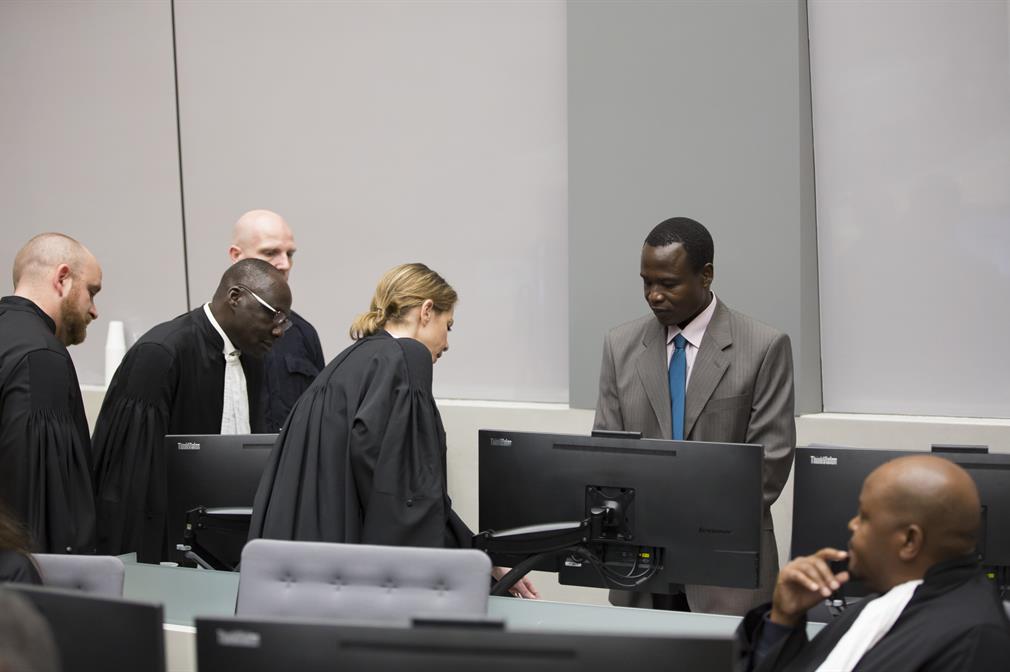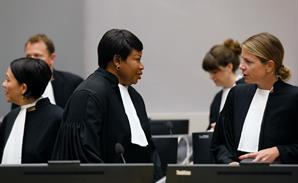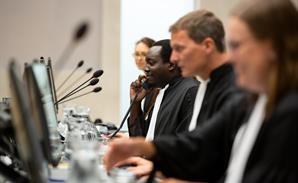
Imagine the captain of a ship in the middle of a Courtroom. That is basically me. Someone has directed that this ship needs to go from point A to Z, and I am in charge of making that happen. It takes a whole crew and it's all hands on deck, or the ship won't go anywhere. Logistically, to make sure we follow judge's orders and everything runs according to plan, I give direction to all supporting staff. A sort of master coordinator. The go-to person and go-between for any request that comes in or any order that goes out. The focal point, with literally all support staff eyes on me.
My name is Caroline and I'm one of two Courtroom Officers at the ICC.
While Court is in session, we coordinate all activity inside the Courtroom. To do this job, you need to like being at the centre of things. You are the strongest multitasker you know. Ideally you would have 10 arms and hands, but since that's tricky, you do the next best thing: You wear a lot of hats. I've got a top 10 list of the hats I wear most often, just to give you an idea.

Planner
Long before a hearing starts, you start planning. You are involved the minute a judge decides there will be a hearing, whether it is to consider authorising an investigation, a suspect's first appearance at the pre-trial stage or the first day of a trial for the accused. You meet with the presiding judge about how you will receive and implement their orders, so they know you run a tight ship. You liaise with the parties, participants and supporting staff to make sure everyone has the documents and information they need, knows the schedule, and is ready to provide their services. Each Court session requires the work of around 80 staff, including stenographers, interpreters, those filming proceedings, security, IT, e-court staff, those supporting witnesses, producing public information and more.
Evidence handler
Before evidence can be presented in Court, you handle it in both electronic and "hard copy" form. You make sure the right people have access to the electronic evidence, depending on its level of confidentiality. The actual physical evidence is brought to you on a trolley for safekeeping in the Registry evidence vault. You take official custody of the evidence, wearing gloves and making sure it is properly preserved. Sometimes these are documents thousands of pages long, and you initial every page. But there are also photographs, personal diaries... in fact, there can be a lot of disturbing content, given the nature of the crimes we address.
Then, during the hearing, you display the evidence on everyone's screens. Always check to see if the evidence can be made public or if Court should go into closed session before you show the evidence. If you see me suddenly jump up and request the level of confidentiality of the evidence, I am triple checking it is OK to be made public.
Fixer
You fix any problems that arise – from legal to practical – and work to avoid them in the first place. You control the temperature, make sure the lights are on, the computers work, everything. If someone spills their water, you make sure it's cleaned up.

Scheduler
Things need to run on time. That means you coordinate with security so the accused shows up in Court on time, that witnesses appear as scheduled, that all evidence is ready to be presented. It also means that you support the judges as they keep time: for example, you keep track when the Prosecution and Defence have the same time allotted to give opening statements, and alert the judges if they are about to go over their allotted time.

Minute-taker
You are the eyes and ears of the Registrar in the Courtroom. Take down what the head of the Registry needs to know and deliver the minutes after each hearing. Share them with the Chamber too.

Legal Officer
You are the guardians of the case files.
So, for example, if a Pre-Trial Chamber commits a case to trial, you draft the related legal filings for the Registry to implement that decision. You submit the case file to the Presidency with a request to create a Trial Chamber. Once the Presidency does so, you implement that order in preparation for the trial, creating new groups and access rights, essentially “creating” the Trial Chamber in the e-court system.
You draft legal submissions for the Registry and advise all parties and participants on their filings, so they comply with the Court's Rules and Regulations. You make sure they know who can access each document, depending on its level of confidentiality. During hearings, you also annotate the transcripts and update the metadata for all records, noting, for example, when the document was used in Court, whether it was reclassified, admitted as evidence, or whether someone objected to that decision.
Receiver/Dispatcher
All orders and activities in the Courtroom go through you.
You receive and make a note of the judges’ orders and dispatch them to the relevant Registry service provider. So if a judge orders a specific video excerpt of the hearings to be posted on the Court website or for victims to be consulted on a certain issue, we make sure the order is received and followed by the right ICC staff according to the deadlines the judges give. There are immediate orders, too, such as when a presiding judge orders us to go into private session. You instantly relay those orders to the rest of the ICC staff who need to make that happen.
Redaction coordinator
As transcripts appear live on your screen, you follow and help out by alerting the Court reporters of any edits required. What you really watch for, though, are potential items to redact: If any statements are inadvertently made in public that should have been confidential, particularly something that could identify a protected witness, someone in the Courtroom (a judge, party, participant, or I myself) will request that it be redacted, or taken off the public record. First, call the AV booth to give them a head's up that a redaction is likely coming. Then, within a minute, prepare the official redaction order and, using a printer hidden down by your feet, print and hand the order to the presiding judge to sign. Once signed, ask the Court Clerk to bring the order to the AV booth and make sure the statement is redacted in both the transcript and the web streamed video. If there is an objection to the redaction order, the judge must make a ruling before we implement, so stand at the ready. All this has to happen within 30 minutes, or it is too late. So, now you know... I am the reason that the Court proceedings are web streamed with a 30 minute delay.
Redactions happen regularly, often a few times an hour. Once, there were eight in one hour, and that was pressure to the extreme. They must be done on time, correctly, protecting the confidential nature of what was said. Finishing the eighth redaction, with no end of confidential matters in sight, I finally, respectfully, asked the presiding judge to consider going into private session. And we did.

Protector
A lot of the job boils down to being able to protect witnesses. Redactions, private sessions, and following orders; largely this is about creating an environment in which they can give testimony.
Taskmaster
Basically, you support all of the practical and logistical things that need to happen so justice can be done. At the end of the day, it's about evidence from all parties and participants, and about judges having all of the information they need to make a decision on a case. You coordinate everything so that they can.

